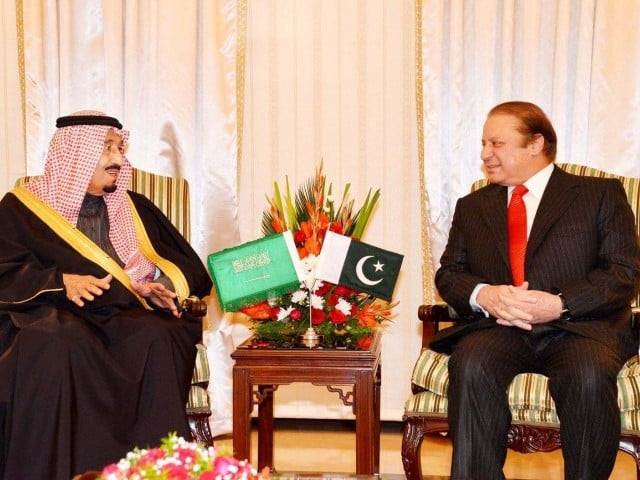Riyadh to press Nawaz for more troops to fight IS threat: report
Islamabad is cautious about broadening its security relationship with Riyadh, the report added

PHOTO: PID
However, as per a report published in Gulf News, Islamabad is cautious about broadening its security relationship with Riyadh.
“There is uncertainty in the Middle East as Saudi Arabia deals with the wider Islamic State-related challenge,” a former national security adviser to Nawaz, Mahmoud Durrani said.
Read: Prime Minister Nawaz departs for Saudi Arabia
“Pakistan has to be careful to avoid getting embroiled in a relationship with the Saudis which only exposes us to new controversies.”
Riyadh is concerned about Islamic State, which has taken over large swathes of land in Iraq and Syria, seeking to target the kingdom.
Read: Erdogan in Riyadh as Saudi Arabia seeks 'Sunni unity' against IS
“The Saudis are very keen to boost their security apparatus, and Pakistan as a friend with a history of services to the kingdom is of great interest,” a western diplomat said.
Similar to Pakistan, Saudi Arabia faces a militant threat.
Read: Islamic State poses serious threat to Pakistan: FO
However, the two countries face challenges in their bilateral relations as the simmering issue of foreign funding to Madrassahs topped an agenda of the National Action Plan to wipe out terrorism.
After nearly a year-long denial, authorities in the Punjab government finally admitted that some 17 Muslim and non-Muslim countries were contributing hundreds of millions of rupees to around 1,000 religious seminaries in the province.
Read: Punjab police disclosure: 1,000 madrassas foreign-funded
The interior ministry in its written reply to the committee informed the lawmakers the names of the countries and the funds they contributed to madrassas in Pakistan, which included: Qatar Rs198m, Kuwait Rs56m, Saudi Arabia Rs42m, Dubai Rs11m, the Netherlands Rs2.5m, United States Rs0.7m, Hong Kong Rs0.1m, Kuwait Rs0.9m and Bahrain Rs1.8m.
The countries’ close relationship has been built on common security interests dating back to the 1970s, when the Saudi oil boom created employment for a large number of Pakistanis.
“In the 1980s the Saudis were keen to keep Pakistani troops as this helped counter the Iranian threat,” says one former Pakistani army general who served in the kingdom. “For the Saudis, the relationship with Pakistan guarantees both against internal dissent and external threats.”



















COMMENTS
Comments are moderated and generally will be posted if they are on-topic and not abusive.
For more information, please see our Comments FAQ